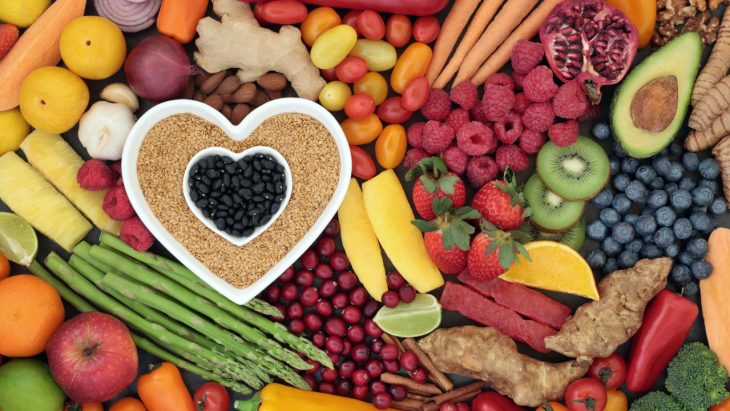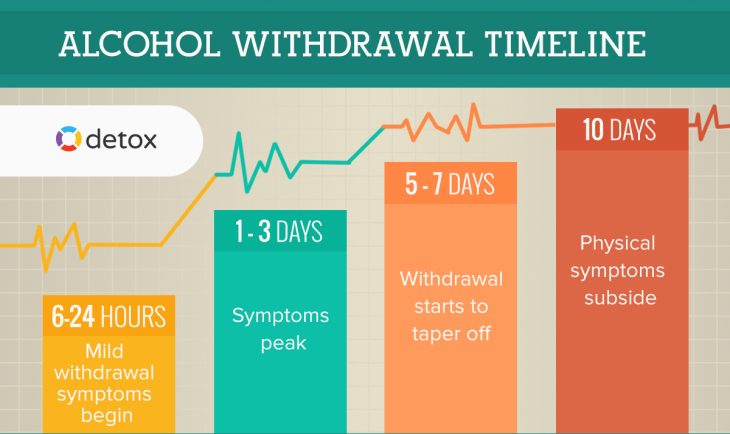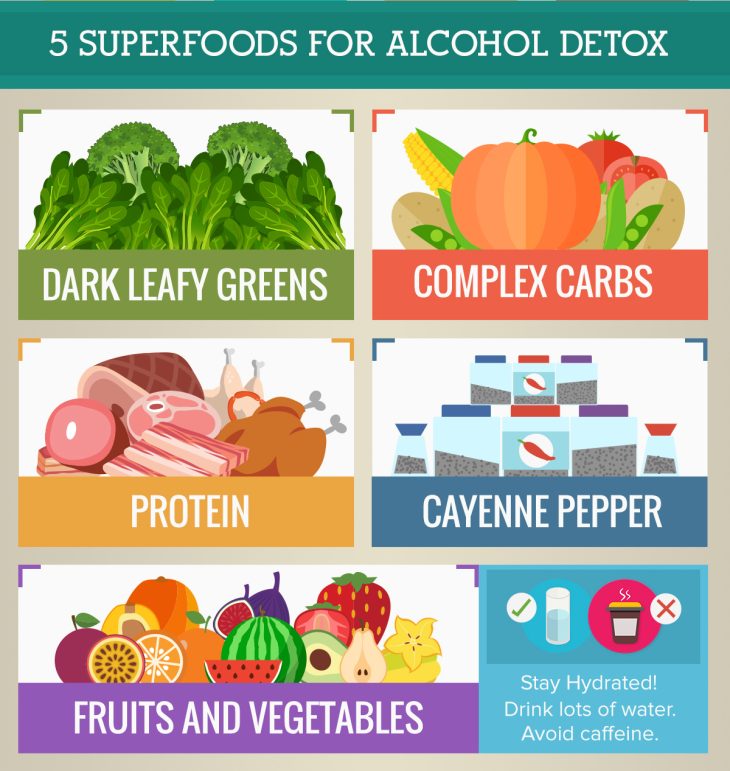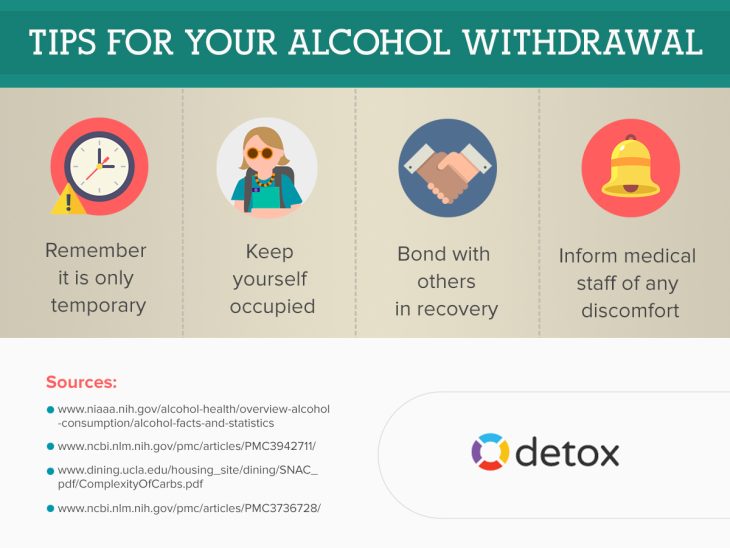Trusted Alcohol Detox Diet: 5 Superfoods for Your Recovery

Consuming liquor can lead to dietary deficiencies resulting in malnutrition, disease and obesity. Alcohol disrupts the absorption of nutrients from food in the digestive system. Developing healthy eating habits through an alcohol detox diet is essential to recovery for healing the body and brain.
Alcohol detox at home can be safe for many folks with alcohol use disorders. This procedure provides opportunities to be safely supervised by your health care professional in the comfort of your home and can even save you money.
If your alcohol dependence is severe, hospitalization and treatment with medications become necessary. Alcohol detox can be life threatening. Your healthcare provider can evaluate and rate your alcohol dependence from mild to severe according to ASAM criteria.
Only you and your health care professional should decide if detoxing at home is safe.
Take the guesswork out of alcohol detox. Call today.
How Alcohol Affects Nutrition and the Body
If you’re able to detox at home, you can start by focusing on nutrition. Since alcohol affects every organ of the body, supportive nutrition with an alcohol detox diet is an essential component to replenishing and rebalancing the system.
- Depleted liver enzymes need help purging toxins left behind by liquor, such as acetaldehyde, methanol, and formaldehyde.
- The kidneys are overworked due to cleansing the blood of toxins.
- The pancreas has exhausted insulin reserves to address the high sugar content in alcohol.
- The brain has struggled to produce the correct levels of dopamine, melatonin and other essential hormones that regulate mood and function.
Healthy nutritional choices will help bring the system back from the imbalance created by alcohol abuse.
28.9 million people in the U.S. over the age of 12 suffer from alcohol use disorder, but only 7.9 percent receive detox and addiction treatment.
Alcohol Detox Diet Timeline and What to Eat During Each Phase

Not everyone feels like eating during the early stages of detox. Fresh smoothies and soft foods are recommended if a person has digestive problems.
Too much protein can over tax the liver, so start with high fiber and moderate proteins. Limit sugar, caffeine and soda. Drink at least 32oz of water a day and supplement with electrolyte replenishing drinks that don’t contain taurine, sugar or artificial sweeteners.
If detox symptoms are mild and withdrawal is more psychological than physiological, a simple diet plan will support the rebalancing of nutrients.
Phase 1: First 24 Hours – Gentle Hydration and Simple Nutrition
Early detox foods can include smoothies made with fruit juices, coconut water and fresh fruit. These add nutrients and fiber to your system. Digestive problems are a common symptom of withdrawal from alcohol, so take it easy on your stomach and intestines.
If you can eat meat, make sure it’s low in fat like chicken breasts and fish. Whole grains will support vitamin and mineral replenishing.
Phase 2: Days 1 – 3, Fighting Cravings and Boosting Energy
Continue with low fat proteins such as black beans, eggs and fish. Carbohydrates can help fight cravings because sugar is the force driving cravings for alcohol and mood dysregulation during withdrawal.
Make sure to eat carbs from healthy foods like green leafy vegetables and not processed foods like crackers and boxed cereal. Healthy sugar is essential to brain function, but processed sugar and alcohol causes nutritional depletion.
Phase 3: Days 4 –7 – Repairing the Gut and Liver
It’s common for people who drink liquor for a long time to need more vitamin B and vitamin A in their systems. Anemia and low energy levels are symptoms of poor metabolism.
You can address these deficiencies with healthy eats. Foods rich in vitamins A and B are whole wheat grains, dairy products such as yogurt, nuts and berries, and fresh fruits and veggies.
Phase 4: Post Detox Diet for Long-Term Recovery
Beginning a vitamin regime supports the rebalancing of the system. Be sure to consult with nutritional specialists about what and how much to take.
Meal planning with foods high in protein, fiber, fruits and vegetables rich in vitamins and minerals is essential. Developing healthy eating habits builds recovery life skills to sustain behavioral changes as life starts to take a new direction.
Alcohol Detox Meal Planning
Evidence suggests that weekly meal planning helps reduce the cost of grocery bills. Learning to read nutrition facts labels can determine which foods contain hidden chemicals or sugars you don’t want in your alcohol detox diet. Calories and daily values of vitamins and minerals are also listed.
Weekly meal plans can help you make sure you’re eating from all the food groups and not heavily favoring one over the others.
Dual Diagnosis and Co-Occurring Disorders Dietary Support Links
When your recovery from alcohol use disorder involves a concurrent diagnosis such as diabetes or depression, it’s important to consult with your medical professional regarding what foods won’t interact with medications. For instance, grapefruits interfere with statins.
If you’re taking insulin for type 1 diabetes, it’s critical to understand which bad and good sugars are allowed. The adrenal and endocrine systems may fluctuate in their production of hormones creating mood inconsistencies.
What to Avoid While Detoxing From Alcohol
Foods that worsen symptoms are processed foods high in fat and sugar and low in nutritional value. Good sugar naturally occurs in fruits, vegetables and dairy products.
Bad sugars are processed and include common food additives like sucrose and high-fructose corn syrup. False sugars are artificial sweeteners such as aspartame, saccharin and sucralose are generally considered safe in moderation.
Foods and drinks that should be avoided during detox include:
- Energy drinks give a false sense of vitality and create metabolism fluctuations. Their sugar spikes cravings because the brain doesn’t differentiate between sugar in alcohol and sugar in candy. Both create a false sense of euphoria.
- Sugars in soda pop and processed foods are linked to various cancers and obesity, heart disease and pancreatic failure.
- Honey is a natural sugar, and while raw or minimally processed honey may retain small amounts of antioxidants, it still affects blood sugar like other sweeteners. Processed syrups and so-called natural syrups, like agave or maple syrup, are all forms of added sugar. The body processes them similarly, regardless of how they’re labeled..
- Caffeine can worsen anxiety, prevent sleep, and exacerbate dehydration..
- Ultra processed foods cause inflammation, tax the liver and stress the pancreas. Good gut bacteria has been linked closely with brain function and should be supported during detox.
Healthy Drinks and Smoothie Recipes
There are blenders and juicers designed specifically for making healthy drinks and smoothies. Here are a few recipes that are simple and easy to create in minutes and can be modified per taste.
- Berries and yogurt: Raspberries, blackberries, blueberries with a teaspoon of honey, ½ cup of coconut water and 4oz of yogurt. Greek yogurt has between 12 and 20 grams of protein, while regular yogurt is a little smoother and has between 7 and 15 grams. Blend with ice if you like it cold and crunchy.
- Green energy: Kale or spinach, cucumber, carrot juice and/or apple juice, with about 6oz of coconut water. A splash of lemon juice adds zing and counters some of the bitterness from the kale. Blend with ice, strain to drink.
- High protein: Using various kinds of protein powders can be helpful, but be aware of the protein source. Whey, pea or soy are common powders. Blend with a banana, peanut butter, almond milk or oat milk, and sweeten with a little honey. Better if chilled.
Super Foods that Boost Metabolism for Recovery

It might be no surprise that detoxing foods are often the same edibles that we regularly hear are good for us. Fruits, veggies, and whole grains are at the top of the list. Consider adding these items when creating an alcohol cleanse diet:
- Dark Leafy Greens: kale, spinach, Swiss chard, mustard and collard greens are packed with vitamins, minerals and antioxidants. They provide iron that’s essential to blood and circulatory health.
- Whole Grains: whole grain foods use the entire part of the grain. Quinoa, brown rice and oats are examples. They help with sugar cravings because they digest slowly, releasing a steady amount of natural sugar into the bloodstream to avoid spikes that cause highs and lows.
- Cayenne and other Chili Peppers: assist in creating healthy bacteria in the digestive system that communicates with the brain to boost the immune system. This can boost healing of viral or bacterial respiratory infections.
- Berries: Raspberries, blueberries, blackberries and strawberries are fiber filled fruits packed with antioxidants and rich in minerals that improves circulation, heart health and brain function.
- Fish: is loaded with vitamin E, iron, calcium and omega 3 fatty acids. It is a high protein food that combats cholesterol and helps keep the circulatory system clean and flowing.
- Legumes: are beans, peas and peanuts, such as lentils, kidney, navy, pinto and black beans, chickpeas and garbanzo beans. They’re a significant source of protein for vegan diets and contain essential carbohydrates and minerals such as manganese and folate.
Sample of a 3 Day Alcohol Detox Diet Plan
| Day 1 | Smoothie, Lentil Soup, Salmon & Greens |
| Day 2 | Overnight Oats, Veggie Stir Fry, Chicken Quinoa Bowl |
| Day 3 | Yogurt & Berries, Sweet Potato Tacos, Tofu Curry |
When to Seek Medical Detox and Nutritional Support
Medically assisted detox is essential if you’ve consumed enough alcohol that trying to quit becomes life threatening. Withdrawal symptoms typically become evident within the first 6-24 hours of the last drink.
Acute withdrawal symptoms can last 7 to 10 days. Between 2-5% of people in hospital alcohol detox programs have a complication of withdrawal known as delirium tremens (DT).
The use of benzodiazepines and other medications can reduce the risk of seizures, DT, and hallucinations, thereby lowering the mortality rate.
If you’re at home trying to quit cold turkey and start experiencing alcohol withdrawal symptoms like shaking, severe headaches, flu like sickness or seeing and hearing things, immediately seek medical attention.
Quick Fixes are a Myth
It’s a myth that recovery ends when detox is over. The chemicals in alcohol may have exited the body, but balancing natural body and brain chemistry can take years. It’s important to not buy into any quick fix herbal detox teas, pills, or diet plans that promise immediate results.
Discipline, endurance and perseverance produce long term sobriety. Slow, steady, small steps lead to long term sustainability in the milestones of behavioral change.

FAQ’s About Alcohol Detox Diet
People often have questions about diet plans that can limit their favorite foods. Here are some common inquiries from those considering using nutrition to supplement their recovery from alcohol.
High protein, high fiber, good sugar and foods high in vitamins and minerals. Avoid processed foods, bad sugar, and caffeine and soda. Drink lots of water with electrolyte replacements.
Nothing speeds up detox, but good nutrition can help the body recover faster than bad nutrition. Consult a nutritionist about getting your body and brain back in balance.
Detox drinks are high in vitamins and minerals and often provide hydration and nutrients, but they don’t speed up the body’s natural detox process. Avoid energy drinks with taurine, caffeine and sugar.
The first 90 days of recovery are the hardest under any circumstances. Allowing your system to recover and replace essential nutrients is an ongoing process. But for the first few months, take it easy on your body.
Supplements can be useful to boost the system’s absorbency and processing of food nutrition. They can be hard on the stomach so consult with your physician and nutritionist for direction.
Finding an Alcohol Detox Center Near You
Congratulations on making the decision to stop using alcohol or any other substance that’s interfering with living your best life. Life changes are difficult to make and keep, but you’re not alone.
There is a plethora of resources available to anyone who wants to make life changes. Success is built on the support of others. When removing unhealthy behaviors there must be a healthy replacement to fill the void. Nutrition, exercise, peer support and treatment are all vital components of the recovery journey.
Explore directories like Detox.com to find treatment and specialized care that meet your needs. You’re worthy of a long and healthy life.



